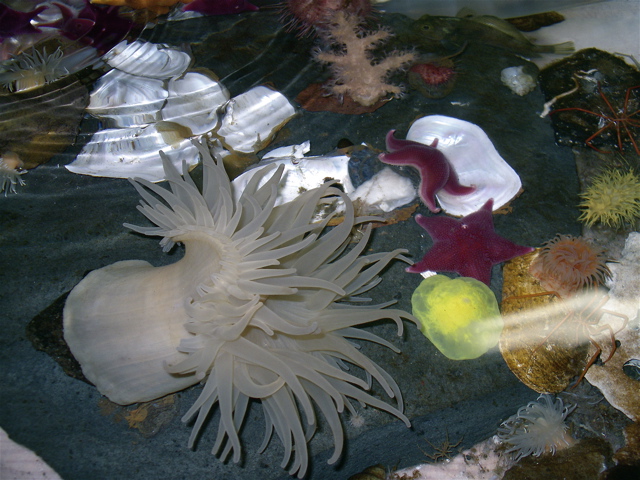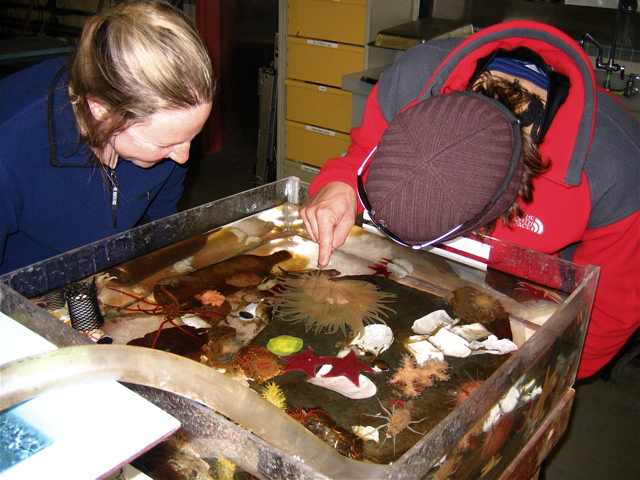( Log In ) Log In is for TREC Teachers & Researchers only
  |
| Dena_Rosenberger |
 Dec 17 2005, 03:09 AM Dec 17 2005, 03:09 AM
Post
#1
|
 TREC Teacher    Group: TREC Team Posts: 96 Joined: 1-November 05 Member No.: 22 |
Gone Fishin’
17 December, 2005 For those interested in things Antarctic, check out the weekly Antarctic newspaper at http://AntarcticSun.usap.gov Hello from the Ice! For additional Antarctic pics, check out the Gallery. Where’s Rosenberger? Aquarium, Crary Labs, McMurdo Station, Ross Island, Antarctica In the early 1960’s Art DeVries discovered a new protein in the blood of fish in Antarctica. To survive in these icy waters they have evolved a protein molecule called Antifreeze Glycoprotein, or AFGP, which binds to miniscule ice crystals that enter the fish’s bodies and prevents the ice from growing. This then prevents their blood and body fluids from freezing. This group of fish is called Notothenoids and includes the Antarctic Toothfish or Cod (Dissostichus mawsonii), Plunderfish (Histiodraco velifer), Snailfish (Paraliparis devriesi), Rock Cod (Trematumus bernachii), Eel pout (Lycodichthys dearborni), and Hemoglobinless icefish (Pagetopsis macropterus, who has no red blood!). The normal freezing point of the salty seawater here is -1.9 degrees C (Remember that 0 is freezing in Celsius). Salt water always freezes at a lower temperature than fresh water and this is why the roads are salted in cold climates. Well, these special fish normally have about two times the amount of salt in their blood as other fish! Just this fact alone allows them to lower the freezing point of their blood to -1.1 C. Now, add to that the AFGP and the freezing point of their blood drops to about -2.1 C, so they can survive in the frigid water. Pretty cool, huh? Literally! Now, they are continuing their studies here at Crary Labs by asking some new questions: What is the evolutionary history of the AFGP gene? How has natural selection for freezing changed the AFGP in Antarctic fish compared to similar fish in the warmer waters of New Zealand? Is there a second antifreeze protein that acts synergistically with AFGP? How do changing water temperatures trigger the physiology of these fish to adapt? It is this last question that is being examined by Dr. Philip Brauer in the Crary Lab Aquarium on the lowest level of this 3-storey lab building. There, they have three large tanks set to different temperatures: -1.5, 1, and 4 degrees C.  The Notothenoid fish that they are studying is the Rock Cod, and in these tanks they can monitor the fish physiology very carefully. One thing that they know is that when fish are placed in warmer water, the fish start drinking more water to decrease the amount of salt in their blood. Well, the water they are drinking is seawater, so they end up with extra salt in their body. They use molecular pumps in the gills to push this excess salt out. The scientists also know that ATP energy is required to keep these molecular pumps operating, and they can monitor ATP. Besides just doing basic science and learning about these fish, these studies may have implications for high blood pressure in humans.  Intense commercial fishing of the Antarctic Cod started during the last decade in the Southern Ocean. It is imperative that we prevent overfishing which could lead to endangering this species that is vital to the Antarctic marine ecosystem. Also in the aquarium, there are “Touch Tanks” filled with other organisms from Antarctic waters, including sea stars, sponges, anemones, urchins, scallops, and big, red, spider-shaped things.   > Big red spider thing:  Me trying to avoid big red spider thing:  Did you know? Some interesting words have developed in Antarctica as part of research station lingo. Here are some terms I have heard around base along with their definitions: boomerang – To start on a flight to or from Antarctica, only to be forced by bad weather to return (Our lead PI “boomeranged” twice trying to get here from Christchurch, New Zealand) bunny boots – Big white plastic boots that have a pressure seal and are part of the ECW gear (and they kinda’ make you look like Bugs Bunny) beaker – slang for scientist; not usually complimentary Big Red – the goose down jackets issued to people working in Antarctica ChCh – pronounced “Cheech,” which means the city of Christchurch, New Zealand, one of the gateways to Antarctica. the crud – flu/cold that most people end of getting here just because everyone is in close quarters inside buildings freshies – fresh fruits or veggies, RARE in Antarctica and much appreciated growler – smallish piece of flat floating ice that may present a hazard to shipping helo – lingo for helicopter (NEVER “chopper”) herbie – a blizzard. Can be extremely fast-moving Herc – a Hercules C-130 cargo plane that can be equipped with skis hero shot – a picture of oneself standing by the sign marking the geographic South Pole mid-rats – food served at midnight (rations) for the “night” shift of workers (of which there are many) PI – Principal Investigator or lead scientist The Ice – Antarctica Winfly – Winter Fly-In, which are flights made into McMurdo in mid-August to bring supplies and new personnel to prepare for the scientists coming for the summer season. I have heard people say, “ I came down at Winfly.” Current Conditions at McMurdo Station Usually I just get the current conditions from this Computer/Television Info program that scrolls through the weather stuff. It is on TVs all around the station and you can also call it up on your computer. It is usually very humorless and just states what is going on in the atmosphere. This morning’s weather was one of the funniest things I have seen down here:  Right now: Although the fog has lifted, low clouds continue to hamper air operations Pressure: 29.355 inHg Winds from SE at 7-18 knots Temperature: 25 oF/-4 oC with wind chill: 9 F/ -13 C Sunset: February 20 at 1:38 am |
| Guest |
 Dec 21 2005, 11:16 PM Dec 21 2005, 11:16 PM
Post
#2
|
|
Unregistered |
wow thats a lot of cool marine animals, I am glad that you at least have stuff to look forward to and it isn't just work for you because all work and no fun makes rosenberger a dull girl.
Amanda Stahl |
  |
2 User(s) are reading this topic (2 Guests and 0 Anonymous Users)
0 Members:

|
NSF Acknowledgment & Disclaimer | Time is now: 8th November 2024 - 02:54 AM |
Invision Power Board
v2.1.7 © 2024 IPS, Inc.








